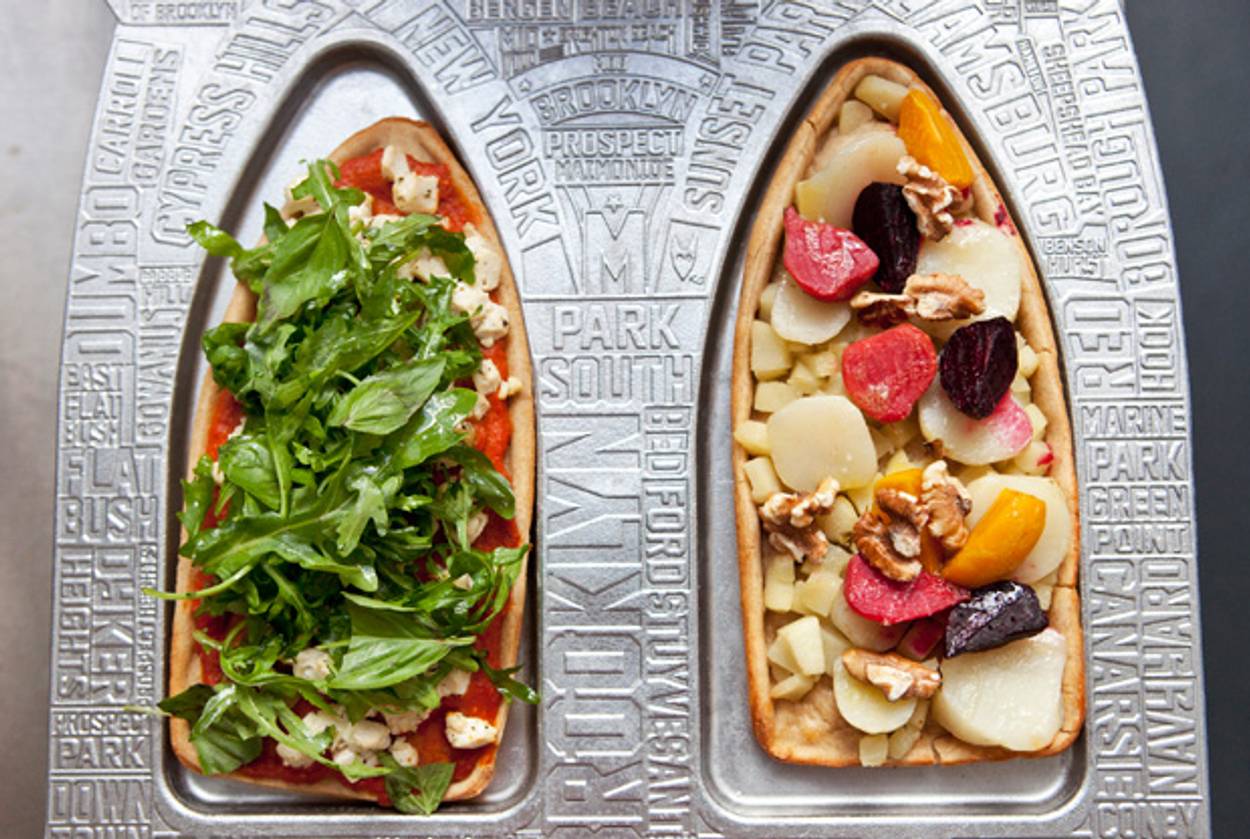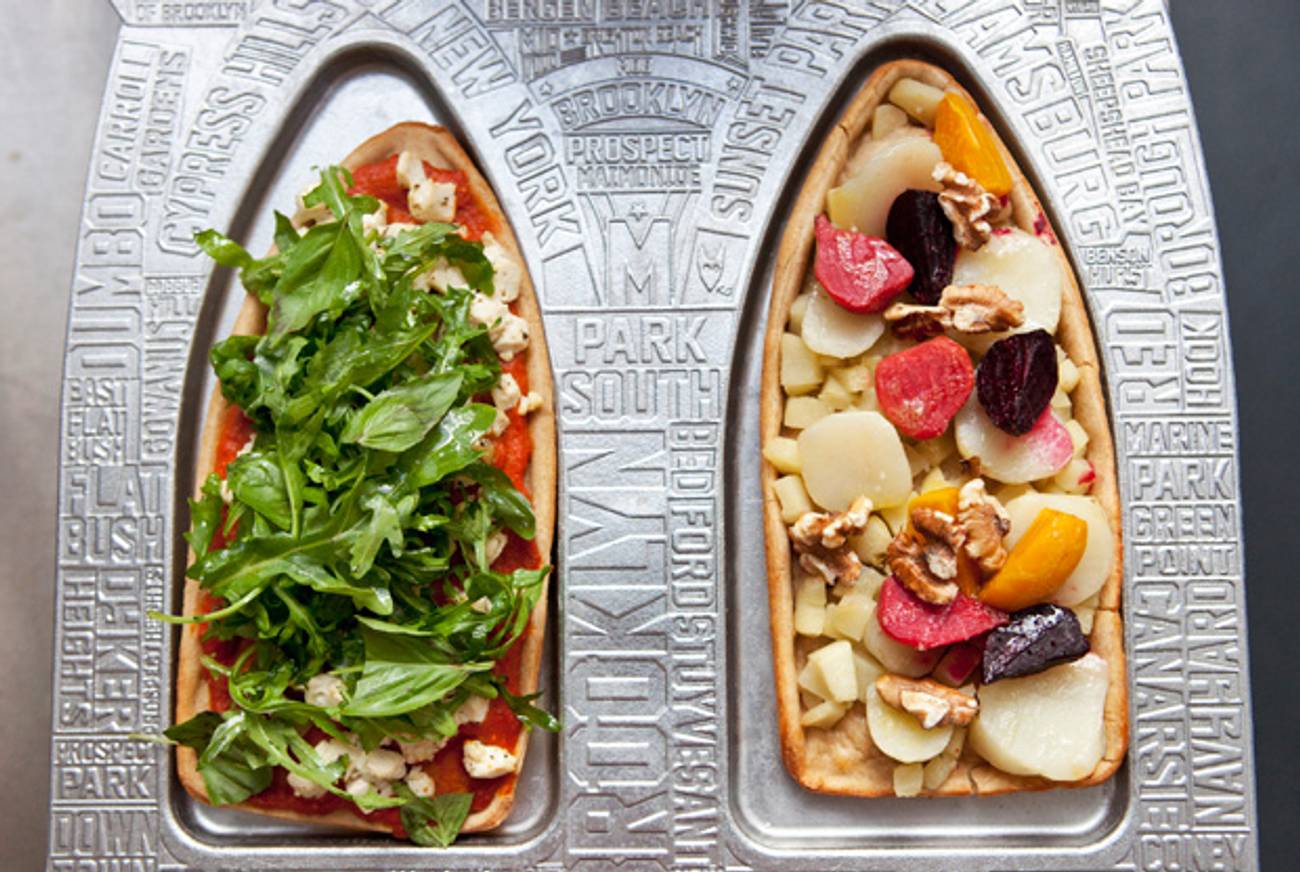Meatless Moses
What does Maimonides have to do with vegan food? A new restaurant in Brooklyn draws unexpected inspiration from the medieval Jewish scholar.




Maimonides, the medieval Jewish philosopher, scholar, and physician, can add another couple of titles to his CV: vegan restaurateur and comic-book superhero.
These latest associations come with last month’s opening of Maimonide of Brooklyn, a vegan restaurant on Atlantic Avenue. Never mind that the restaurant has shortened the legend’s name by one letter, or that the voicemail message pronounces it in three syllables that rhyme—vaguely—with “cyanide.” Brooklynites looking for a vegan eatery influenced by the teachings of the Rambam finally have a spot to call their own.
Chef Neal Harden is visible in the kitchen, churning out vegan specialties, with tattoos up both arms and a backward hat jammed on his head. While customers snack on complimentary baked kale chips and “M.O.B’s”—signature open-faced sandwiches served on plates shaped like the Brooklyn Bridge—they can peruse the restaurant’s eponymous comic book, featuring Barack Tomahawk. When this tough, baggy-pants-wearing pizza delivery guy falls into a pile of melons and becomes imbued with superpowers linked to fruits and vegetables, he transforms into “Maimonide of Brooklyn,” a “vegan version of the Green Lantern.”
The brains behind this operation? A French philosopher, but of course.
“To eat well is like being a superhero,” said owner Cyril Aouizerate one recent sunny Tuesday. He’d made his way to one of the restaurant’s four large communal tables after bestowing kisses and fist bumps to diners, only some of whom appeared to know him. (One surprised diner, post-kiss, said: “I’m not really a regular. But that made me want to become one. That guy is great.”) He reeked of cigarette smoke and, with his bowler hat, heavy leather jacket, thick glasses, and scruffy beard, looked the physical embodiment of the restaurant’s urban-bohemian Atlantic Ave. vibe.
Aouizerate had just flown in from Paris, where he lives most of the year, for a press event with his business partner Alain Senderens, the French chef of haute cuisine famous for returning his Parisian restaurant’s three Michelin stars in the name of simplicity and affordability.
“With the name of Senderens, I could have started a gastronomic restaurant for $100 a plate in Manhattan,” said Aouizerate, playing with the fist-sized Brooklyn Bridge pendant hanging off a heavy silver chain around his neck. (Engraved on the bottom of each bridge post are the names of his three children: Eve, Amos, and Noe.) But Aouizerate, who’d worked with Senderens to open France’s hip-affordable Mama Shelter hotel chain, wanted to use the chef’s expertise and influence for something a little more unusual.
Born in Toulouse to a Jewish family, Aouizerate first came to Brooklyn in 1986 when visiting a Lubavitch community and became enamored with the borough. When looking for the perfect neighborhood for his newest venture, he deemed Williamsburg “too hipster”—or, in Cyril-speak “eep-stair”—opting instead for Boerum Hill. Yet Maimonide of Brooklyn’s skinny-jeaned clientele, mix of jazz and rap playing from an old gramophone, and a memorial vegetable art wall (“R.I.P. Mr. Avocado, he died for guacamole”) certainly give Williamsburg a run for its money.
Aouizerate has been enamored with Maimonides nearly as long as he has with Brooklyn. (This passion is apparently infectious: Before answering Aouzierate’s Craigslist ad for a chef, Harden had never read Maimonides, but now he calls himself a fan.) When studying in Jerusalem in 1992, after earning his doctorate in philosophy from the Sorbonne, Aouizerate came across a rare text Maimonides wrote when physician to King Saladin touting the salutary effects of various fruits and vegetables. This was his first encounter with the Rambam’s dietary philosophy.
“I was very impressed that he had written this a thousand years ago,” said Aouizerate, mentioning a particular passage about a carrot. “It was very modern. And I thought, well, ‘That’s fucking interesting.’ ”
Aouizerate couldn’t pinpoint the exact text, calling it “more of a pamphlet than a book.” Yet a couple days’ worth of research by an impartial party yielded no evidence that Maimonides was a vegetarian or a vegan. He was certainly attuned to the influence of diet on health, but the man appears to have loved his meat. In Medical Aphorisms of Moses, the medieval philosopher, like many a bubbe after him, touts the wide-ranging salutary effects of chicken soup; it helps with everything from calming colic to dissolving kidney stones to increasing sexual potency, he claims. Betraying gourmand tendencies that go beyond medical philosophy, he recommends pairing the broth with coriander or fennel, and, during the summer, a bit of lemon.
Many of his dietary beliefs are compiled in Regimen of Health, which he wrote in 1198 for an Egyptian sultan who complained of depression, constipation, indigestion, and alcoholism, among other things. In addition to recommending proper physical exercise, Maimonides stresses the importance of diet, writing that physicians shouldn’t “employ medicaments if they can manage the sick by regulating nourishment alone.”
His recommendations often read haphazardly, and many appear unsupported, though perhaps this is due to his effort at pithiness and brevity. Maimonides advises drinking only cold water during meals, nixing all but the freshest, mildest cheese, avoiding most tree fruits, and eating less during summer than winter. He places garlic, onion, leek, radish, cabbage, and eggplant on his list of vegetables that are “very bad for whoever wishes to conserve his health,” while allowing that “cucumber and the gourd are less harmful.”
Most relevant to the new Brooklyn restaurant, Maimonides names “sheep that graze on the foothills” as providing man with the very best meat. Indeed, the first two foods he includes in his list of “good foods that ought to be adopted by everyone who desires the continuation of his health” are “the meat of sheep that are one or two years old [and] the meat of the chicken.”
This does not faze Aouizerate, who says that Jewish ritual slaughter laws, discussed in other works by Maimonides, suggest that meat should be eaten only on the Sabbath, and that, Maimonides notwithstanding, big agriculture and the abysmal state of slaughterhouses in America are reason enough to limit meat consumption. Lamenting the fact that neighborhood rabbis don’t eat at the restaurant because it isn’t certified kosher, Aouizerate calls his restaurant “spiritually kosher.” It would be just as fair to call it “spiritually Maimonidean”; the menu, like the philosopher, supports mindful eating.
Aouizerate hasn’t had meat in years. Presumably, that is a consequence of his philosophical study?
The philosopher stretched his arms over his head and exhaled loudly, then adjusted his glasses.
“Me? I became vegan to seduce a woman.” He paused. “Now she is my wife.”
And with that, he stood up and made his way out into the Brooklyn sunshine.
Sophie Brickman is a former staff reporter for the Food & Wine section of the San Francisco Chronicle, and her work has appeared in the Atlantic Monthly, the Huffington Post, GQ, and the 2011 edition of Best Food Writing.
Sophie Brickman is a former staff reporter for the Food & Wine section of the San Francisco Chronicle, and her work has appeared in the Atlantic Monthly, the Huffington Post, GQ, and the 2011 edition of Best Food Writing.